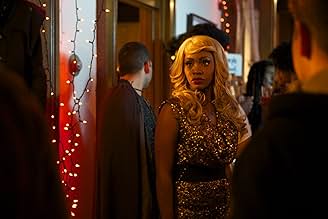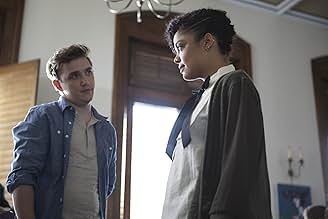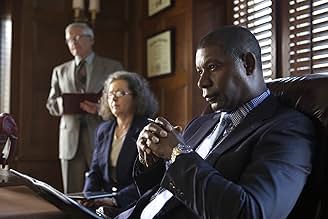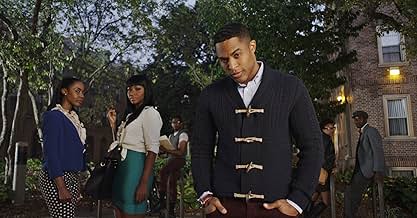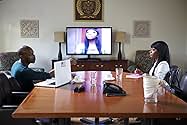AVALIAÇÃO DA IMDb
6,2/10
27 mil
SUA AVALIAÇÃO
A vida de quatro estudantes negros em uma faculdade da Ivy League.A vida de quatro estudantes negros em uma faculdade da Ivy League.A vida de quatro estudantes negros em uma faculdade da Ivy League.
- Prêmios
- 13 vitórias e 28 indicações no total
Brandon P Bell
- Troy Fairbanks
- (as Brandon Bell)
Kate Gaulke
- Annie
- (as Katie Gaulke)
Bryan Daniel Porter
- Gordon
- (as Bryan Porter)
Avaliações em destaque
The film is essentially one big soapbox and dropped the ball many times and in many different ways.
I want to talk about the positives first and the reason(s) the film is definitely worth watching: I was really impressed with the production value, the acting (most of it) and the humour. I think Teyonah Parris deserves special mention because she was the character I most empathised with simply because she was the only one looking at things from both angles. Tyler James Williams also stood out due to his humour and commitment to his role.
Keeping in mind that a person (or persons) wrote this script with the intention of instigating discussion about the issues raised, I think it's only fair to discuss those issues in reviews especially as some of the commentary affected my enjoyment of the film.
Obviously the film deals with more substantial issues but those applied (mainly) to the USA so to address a few lesser issues: Hair. This subject grates a little (/a lot) for me because I've never heard white people make comments about black hair. Again, this might be a bigger, more well-known topic in the US but here in the UK, I don't think anyone has ever looked twice at a black person's hair. The obsession appears to lie with black (USA) people, not with white people. What is the problem with someone touching your hair? I had a fringe cut in a few months back and people touched it and made comments. When I have my hair curly, people touch it and make nice comments. It might be annoying for you but hair isn't a race issue, it's a hair issue and anyone who focuses on this 'issue' needs to get over it. When Teyonah's character expressed annoyance with being asked if she 'weaved' her hair, I couldn't help but wonder why that was a problem. First of all, how many people say 'Google it'? We make verbs out of nouns all the time and the fact that her white friend asked if it was her own hair, instead of assuming that it wasn't, actually says a lot. Women discuss hair. White women ask each other if they have extensions, if they've had plastic surgery etc. and so for anyone to be annoyed at being asked if they are wearing a weave actually highlights how insecure they are. Not every question or action by a white person is about race. Sometimes it's genuinely about curiosity and taking interest in another person. If you are so touchy about every subject, white people will not want to talk to you for fear of offending you, not because they are racist.
There were other bits of commentary that I took issue with but I don't want my review to turn into a soapbox, so I'll move on to the main gripes I had with the film: When Tessa's character stated that it wasn't possible for black people to be racist, the film lost all credibility. The definition of 'racist' is not up for debate. We have dictionaries to clarify and after consulting one, there is absolutely no mention that in addition to holding the belief that one race is superior to another "the race believed to be inferior must also be negatively affected in some way". It is indeed possible for a black person to hold the belief that one race is better than another which would in fact, make them a racist. How their racist beliefs affect the race they believe to be inferior is irrelevant to the fact that they would be considered racist.
Finally, I disagree that white people dressing up as black people (make-up and all) is (always) the same thing as 'blackface' and I think the more that people focus on these scenarios as opposed to the real blackface which goes on in the industry, the more that film makers will get away with continuing the real tradition of blackface right under everyone's noses.
It's all about intention. Going to a party and dressing as your idol, make-up and all, is flattering and should be encouraged. There is nothing wrong with wanting to look like someone you idolise and when white people are accused of being racist for donning an afro wig and make-up, all that happens is that white people try to isolate themselves from 'ethnic' people to avoid being accused of racism.
The party in the film however, was 100% racist and offensive because the invitation was decidedly unflattering and had nothing to do with celebrating black people.
True blackface is about 'presenting an acceptable image of black people to the world'. Which is interesting when you consider that the main protagonist of this film is mixed-race. It appears that the lead role was written in such a way that allowed the casting of a light skinned woman when it could just as easily have been written in a way that would allow for a dark skinned woman to make all the same points. Casting a light skinned actress to play a dark skinned black woman, is blackface. Especially considering that they will likely apply dark make-up to her skin. Casting a white woman to play a dark skinned Latin-American woman is in the spirit of blackface. Every time a white or light skinned person is given the role of someone who 'should' be darker, that is blackface.
It's not about the make-up. It's about why you're wearing the make-up and any film which tries to hammer home a point about racism using the controversial theme of blackface, while casting a light skinned woman in the leading role, loses a few stars on IMDb for the sheer hypocrisy.
6/10 (it's good entertainment but the message is a bit off)
I want to talk about the positives first and the reason(s) the film is definitely worth watching: I was really impressed with the production value, the acting (most of it) and the humour. I think Teyonah Parris deserves special mention because she was the character I most empathised with simply because she was the only one looking at things from both angles. Tyler James Williams also stood out due to his humour and commitment to his role.
Keeping in mind that a person (or persons) wrote this script with the intention of instigating discussion about the issues raised, I think it's only fair to discuss those issues in reviews especially as some of the commentary affected my enjoyment of the film.
Obviously the film deals with more substantial issues but those applied (mainly) to the USA so to address a few lesser issues: Hair. This subject grates a little (/a lot) for me because I've never heard white people make comments about black hair. Again, this might be a bigger, more well-known topic in the US but here in the UK, I don't think anyone has ever looked twice at a black person's hair. The obsession appears to lie with black (USA) people, not with white people. What is the problem with someone touching your hair? I had a fringe cut in a few months back and people touched it and made comments. When I have my hair curly, people touch it and make nice comments. It might be annoying for you but hair isn't a race issue, it's a hair issue and anyone who focuses on this 'issue' needs to get over it. When Teyonah's character expressed annoyance with being asked if she 'weaved' her hair, I couldn't help but wonder why that was a problem. First of all, how many people say 'Google it'? We make verbs out of nouns all the time and the fact that her white friend asked if it was her own hair, instead of assuming that it wasn't, actually says a lot. Women discuss hair. White women ask each other if they have extensions, if they've had plastic surgery etc. and so for anyone to be annoyed at being asked if they are wearing a weave actually highlights how insecure they are. Not every question or action by a white person is about race. Sometimes it's genuinely about curiosity and taking interest in another person. If you are so touchy about every subject, white people will not want to talk to you for fear of offending you, not because they are racist.
There were other bits of commentary that I took issue with but I don't want my review to turn into a soapbox, so I'll move on to the main gripes I had with the film: When Tessa's character stated that it wasn't possible for black people to be racist, the film lost all credibility. The definition of 'racist' is not up for debate. We have dictionaries to clarify and after consulting one, there is absolutely no mention that in addition to holding the belief that one race is superior to another "the race believed to be inferior must also be negatively affected in some way". It is indeed possible for a black person to hold the belief that one race is better than another which would in fact, make them a racist. How their racist beliefs affect the race they believe to be inferior is irrelevant to the fact that they would be considered racist.
Finally, I disagree that white people dressing up as black people (make-up and all) is (always) the same thing as 'blackface' and I think the more that people focus on these scenarios as opposed to the real blackface which goes on in the industry, the more that film makers will get away with continuing the real tradition of blackface right under everyone's noses.
It's all about intention. Going to a party and dressing as your idol, make-up and all, is flattering and should be encouraged. There is nothing wrong with wanting to look like someone you idolise and when white people are accused of being racist for donning an afro wig and make-up, all that happens is that white people try to isolate themselves from 'ethnic' people to avoid being accused of racism.
The party in the film however, was 100% racist and offensive because the invitation was decidedly unflattering and had nothing to do with celebrating black people.
True blackface is about 'presenting an acceptable image of black people to the world'. Which is interesting when you consider that the main protagonist of this film is mixed-race. It appears that the lead role was written in such a way that allowed the casting of a light skinned woman when it could just as easily have been written in a way that would allow for a dark skinned woman to make all the same points. Casting a light skinned actress to play a dark skinned black woman, is blackface. Especially considering that they will likely apply dark make-up to her skin. Casting a white woman to play a dark skinned Latin-American woman is in the spirit of blackface. Every time a white or light skinned person is given the role of someone who 'should' be darker, that is blackface.
It's not about the make-up. It's about why you're wearing the make-up and any film which tries to hammer home a point about racism using the controversial theme of blackface, while casting a light skinned woman in the leading role, loses a few stars on IMDb for the sheer hypocrisy.
6/10 (it's good entertainment but the message is a bit off)
Menippian and Juvenalian satire are at the forefront here. There's no comedy, there's just a message. Unfortunately, today, people have allowed this satirical work to become reality. Set at a prestigious Ivy League school outside of Chicago proper, "Dear White People" takes so much time on the inherent differences between black and white people, that it takes no real time or consideration to realize that it's the American culture that binds everyone together. It's not a bad film, and my opinion of it has grown for the better over time because it must be taken as a satire instead of a message. Obviously the filmmakers have it in mind that one particular group is the enemy, when the reality is that the far left politics are used to brainwash extremely smart and talented minds.
The first 20min was OK... I thought it was going to be funny. Then it gets laughably silly, campy and pretentious. The actors are caricatures of real people. At first you think in the next scene you'll suddenly find more depth and things will come into focus, but no... In the end it's got this sad "Stick to your own people, stop trying to pretend to be white/black if you're not" message which really makes me feel sad for whomever wrote this. What a dark little world they live in. The bits about colleges throwing black-face parties all the time are even a bit ridiculous. The movies based in some fictional ivy league school, but the examples they give are all of tiny colleges no-ones ever heard of. I'm not saying there isn't a race problem in this country, there is for sure. But what this movie is portraying is wildly exaggerated. This is the kind of movie the real racists watch and say "That doesn't happen! It's all made up!" and they're right.
- I think every generation has a film that touches on race and the inequalities of color. Spike Lee, Do the Right Thing comes to mind as do other countless films. In Dear White People (a take off on a character's name that is White) it explores the state of college campus today. Where the halls are segregated and the division is along social economic lines and on the fringes of race. There is the commentary that Obama is half white, so that makes him half right, touches on the degrees of it means to be black today. Not all a series manner, but sometimes you do become the change you want to bring, but often it is much harder to live the talk than to talk the talk. I saw this movie as part of the 2014 Atlanta Film Festival.
I am glad that this film addresses the important issue of racism on college campuses, and I have no disagreement with its political or social justice messages. Any sincere attempt by a filmmaker to make these experiences visible to the broader public is a good thing.
As a white educator who actually attended and later taught at top- tier colleges, I had been looking forward to experiencing a new sharp creative critique of American racism on college campuses as promised by the film's trailer.
This film utterly failed in its attempts to entertain or provoke. It did not provide me even with the typical pleasures of cinema, let alone fresh insight into its subject. It was little more than a leaden slow-moving soap opera with a contrived plot, oddly dressed characters and unconvincing dialogue. In my experience of elite campuses, it is the rare Ivy student (of any race) who routinely dresses like a junior business executive and uses this sort of pretentious speech pattern. Watching this film was like watching a Western in which all the characters had British accents and wore kimonos.
For readers who seek moving and insightful films on racism, I highly recommend Spike Lee "joints" which provide viewers with superior entertainment, dialogue, characters, plot, provocation and insight.
As a white educator who actually attended and later taught at top- tier colleges, I had been looking forward to experiencing a new sharp creative critique of American racism on college campuses as promised by the film's trailer.
This film utterly failed in its attempts to entertain or provoke. It did not provide me even with the typical pleasures of cinema, let alone fresh insight into its subject. It was little more than a leaden slow-moving soap opera with a contrived plot, oddly dressed characters and unconvincing dialogue. In my experience of elite campuses, it is the rare Ivy student (of any race) who routinely dresses like a junior business executive and uses this sort of pretentious speech pattern. Watching this film was like watching a Western in which all the characters had British accents and wore kimonos.
For readers who seek moving and insightful films on racism, I highly recommend Spike Lee "joints" which provide viewers with superior entertainment, dialogue, characters, plot, provocation and insight.
Você sabia?
- CuriosidadesSam makes a student film that is critical of what she sees as white people's widespread fear of Barack Obama and titles it "Rebirth of a Nation." This is a reference not only to D.W. Griffith's notoriously racist 1915 Civil War movie O Nascimento de Uma Nação (1915) but also to something that filmmaker Spike Lee experienced while he was a first-year student at NYU's graduate film school. After being required to watch Griffith's film and objecting to the fact that his professors taught it only as a milestone in the technical development of cinema with no attention paid to its racism and its legacy of helping to relaunch the KKK, Lee made a student short film titled The Answer (1980) that responded to The Birth of a Nation himself. "The Answer" so offended many of his NYU professors that Lee was nearly expelled from NYU, but was ultimately saved by a faculty vote.
- Erros de gravaçãoWhen Sam is in the dining hall and chastises Kurt for eating in their dining hall - just before she stands up; she closes her Macbook twice.
- Citações
Professor Bodkin: ...Might I also remind you that I read your entire fifteen-page unsolicited treatise on why the Gremlins is actually about suburban white fear of black culture.
Sam White: The Gremlins are loud, talk in slang, are addicted to fried chicken and freak out when you get their hair wet.
- Cenas durante ou pós-créditosThe end credits include photographs of the real-life blackface (and brownface) college parties that inspired the film's climax.
- ConexõesFeatured in Number One on the Call Sheet: Black Leading Women in Hollywood (2025)
- Trilhas sonoras45 Drum Break
Performed by The Co-Stars
Written by Neely Dinkins Jr. (as Neely Dinkins)
Vito Colapietro Courtesy of Atom Factory Music Licensing
Principais escolhas
Faça login para avaliar e ver a lista de recomendações personalizadas
- How long is Dear White People?Fornecido pela Alexa
Detalhes
- Data de lançamento
- País de origem
- Central de atendimento oficial
- Idioma
- Também conhecido como
- Dear White People
- Locações de filme
- Empresas de produção
- Consulte mais créditos da empresa na IMDbPro
Bilheteria
- Faturamento bruto nos EUA e Canadá
- US$ 4.404.154
- Fim de semana de estreia nos EUA e Canadá
- US$ 347.959
- 19 de out. de 2014
- Faturamento bruto mundial
- US$ 4.633.961
Contribua para esta página
Sugerir uma alteração ou adicionar conteúdo ausente








